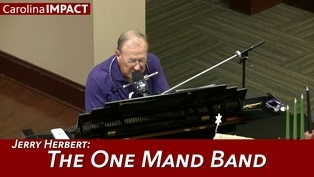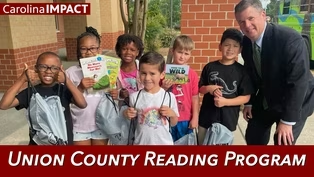
Immigration in the Carolinas
Clip: Season 11 Episode 1112 | 6m 58sVideo has Closed Captions
A migrant family in Charlotte talks about their dream of citizenship. And the dangers.
You’ll be hearing a lot about immigration this election year. How to better enforce our borders – while still welcoming those looking for a better, safer life in the US. But how does the surge of migrants affect us here in Charlotte? This week, we look at both sides of the border crisis – with locals from both Carolinas who have been there, to see it for themselves.
Problems playing video? | Closed Captioning Feedback
Problems playing video? | Closed Captioning Feedback
Carolina Impact is a local public television program presented by PBS Charlotte

Immigration in the Carolinas
Clip: Season 11 Episode 1112 | 6m 58sVideo has Closed Captions
You’ll be hearing a lot about immigration this election year. How to better enforce our borders – while still welcoming those looking for a better, safer life in the US. But how does the surge of migrants affect us here in Charlotte? This week, we look at both sides of the border crisis – with locals from both Carolinas who have been there, to see it for themselves.
Problems playing video? | Closed Captioning Feedback
How to Watch Carolina Impact
Carolina Impact is available to stream on pbs.org and the free PBS App, available on iPhone, Apple TV, Android TV, Android smartphones, Amazon Fire TV, Amazon Fire Tablet, Roku, Samsung Smart TV, and Vizio.

Introducing PBS Charlotte Passport
Now you can stream more of your favorite PBS shows including Masterpiece, NOVA, Nature, Great British Baking Show and many more — online and in the PBS Video app.Providing Support for PBS.org
Learn Moreabout PBS online sponsorship- Yeah, you can see the extent of the immigration problem here in Charlotte's Immigration Court, where this new study shows that the backlog of pending asylum cases in North Carolina has nearly tripled since the year 2021.
Back then, the Charlotte Immigration Court had 8,240 asylum cases, but in 2022, the number of cases increased to more than 12,000.
And last year, while there were almost 22,000 pending asylum cases, with those thousands of migrant families who crossed the border in Texas, now living here in Charlotte, simply waiting for their day in court.
- Super.
(chuckles) Very good.
- [Jeff] Pedro and Alejandra and their two daughters share family photos and smiles after so many miles.
(Pedro speaking foreign language) - [Translator] Yes, our life is so different from how it was in Venezuela without a doubt.
But the story of how we got here, we could spend ages telling you all the things that happened to us on our journey here.
We could fill up a book about this thick, and it still wouldn't be as near depth about our experience of getting here.
- Colombia, Panama, Puerto Rica, Nicaragua, Guatemala.
- In Mexico.
- In Mexico.
- Can you talk about why you wanted to come to the U.S., why you wanted to make that long trip from Venezuela to the border?
Talk a little bit about what made you bring your family here in the first place.
(Pedro speaking foreign language) - [Pedro's translator] He starts off by saying that's a hard question.
That's a hard hitting question.
And then she started saying that the reason why we left was we wanted to make a better life for my family.
Once we were on the way there, we couldn't stop and think about the past.
We needed to go forward, keep moving, and think about the future.
(chanting in foreign language) There's no secret.
Everybody in the world knows how chaotic my country is.
Everybody knows the situation that's going on there, but the hunger that we faced, the stress that we faced, we knew that we needed to make a change.
(Pedro speaking foreign language) We finally got to Mexico and we had to get on a train to be able to make it down to the border.
On that train, it was very dangerous.
They almost stole one of my youngest daughter.
They almost took her away from me.
And just the things that my family had to experience while on that train was very difficult.
But once we got to Mexico and we got to the border, we said, "We finally made it."
But the hardest part was yet to come, which was to cross.
- [Jeff] But after eight months on the road, and two more months at the Mexican border, on the streets with thousands of other migrant families, well, that's when Pedro and Alejandra met Rusty Price, the founder and CEO of Camino, Charlotte's nonprofit Latino relief agency.
- And I was just overwhelmed with the reality of what they had actually been through and were going through.
- [Jeff] And Price sees that same reality for other migrant families, every time his group from Camino travels to the Mexican border, offering those families the same simple comforts Camino promised to Pedro and Alejandra - care and prayer.
- So much fear and threatening situations.
They were very guarded at the beginning.
For me, it was just, let's give 'em a little bit of a reprieve from what they've been going through.
- Tell me about what you're seeing firsthand that we are not seeing back here in Charlotte or elsewhere.
- Being there and in meeting the people and understanding their mindset, they're not trying to sneak in.
And so we never met one person, and we met hundreds, that weren't following the process that they were told was legal.
So in their minds, they're not illegal aliens.
They are following our laws to ask for political asylum.
If we deport, my economy collapses.
To me, it's the slavery of our generation.
And it has to be fixed.
- [Interviewer] Where are you coming from?
- Oh, we're from South Carolina.
- South Carolina.
- [Interviewer] You got family at home?
- I do, I do.
A wife, a little boy.
- [Jeff] For now, that fix also involves soldiers from the South Carolina National Guard who were deployed for a month-long mission at the border in Texas last summer.
- Right now, our directive is to pay deter.
We need you to go back to Mexico.
We can't let you in this area.
We're not using any force or anything like that.
It's very cordial.
But our mission is to deter the migrants.
- Roger, this is Lima SOG.
We've got a group of migrants down here sitting at approximately 14:28.
- [Jeff] But this video from Scripp's News service shows that even from the American side of the border, even when immigrants do cross illegally, those South Carolina soldiers who were there to stop them were also there to help them.
(speaking foreign language) - Where's your guy coming with the truck?
Do you know where he is?
- I have no clue, all right?
- Could you get me a truck to turn AC on and get him in?
- Yeah, we can.
- He showed signs of dehydration.
He's throwing up stand up, and then he just fell to the ground.
So they are gonna get him medical services.
- Alright, just get the door for me.
- [Interviewer] Is it hard to see all that?
- It is, it's pretty tough seeing the children and kids, but you get used to it.
It's just constant crossing.
- There's no doubt it's a crisis.
I think it's a crisis on many, many levels.
It has to be addressed.
But the way we are communicating about it right now, I don't think it has any good result at all.
(Pedro speaking foreign language) - [Translator] To all my countrymen and to all my fellow immigrants, I would tell you to really think things through.
It's a very difficult journey, lots of hardships.
And I know this because I experienced all those hardships with my own family.
So we don't want to come to this country to receive handouts.
We want to work, we want to create a better life.
- And while that better life goes on for newcomers here in North Carolina who crossed the border to live here, well, so does the waiting.
In fact, that same study we mentioned earlier of the immigration court here in North Carolina, it shows the average wait time for an asylum hearing is 1,727 days.
That's the fifth highest average in the country.
And it adds up to almost four and a half years of waiting.
Video has Closed Captions
Clip: S11 Ep1112 | 3m 32s | A talented entrepreneur in Charlotte, known for her incredible donut creations (3m 32s)
Jerry Herbert, The One Man Band
Video has Closed Captions
Clip: S11 Ep1112 | 4m 45s | Musician Jerry Herbert has been entertaining music lovers for more than 25 years. (4m 45s)
Video has Closed Captions
Clip: S11 Ep1112 | 4m 29s | Local superintendent is dedicated to program that helps students become stronger readers. (4m 29s)
Carolina Impact: January 23rd, 2024 Preview
Preview: S11 Ep1112 | 30s | Immigration in the Carolinas, Union Co. Reading, Beyond Amazing Donuts, & Jerry Herbert (30s)
Providing Support for PBS.org
Learn Moreabout PBS online sponsorship
- News and Public Affairs

Top journalists deliver compelling original analysis of the hour's headlines.

- News and Public Affairs

FRONTLINE is investigative journalism that questions, explains and changes our world.












Support for PBS provided by:
Carolina Impact is a local public television program presented by PBS Charlotte



